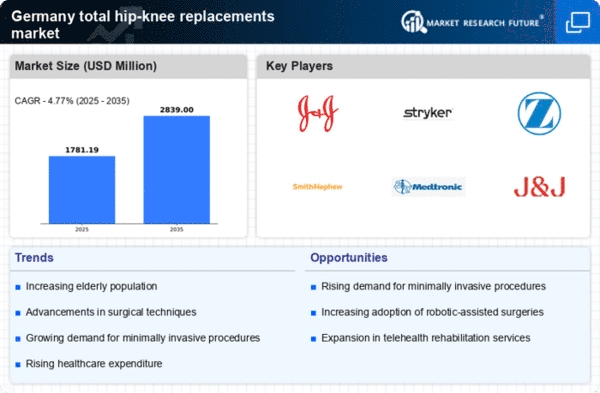Increased Healthcare Expenditure
Germany's healthcare expenditure has been on an upward trajectory, which positively influences the total hip-knee-replacements market. The government allocates a significant portion of its budget to healthcare, with spending reaching approximately €400 billion in recent years. This financial commitment facilitates access to advanced medical technologies and surgical procedures, including hip and knee replacements. As healthcare budgets expand, hospitals and clinics are more likely to invest in state-of-the-art equipment and training for medical professionals. Consequently, this trend may lead to improved patient outcomes and increased surgical volumes, further propelling the total hip-knee-replacements market. Additionally, the emphasis on quality healthcare services aligns with the growing demand for effective treatments, thereby enhancing market prospects.
Rising Awareness of Joint Health
There is a growing awareness of joint health among the German population, which serves as a significant driver for the total hip-knee-replacements market. Educational campaigns and health initiatives have increased public knowledge regarding the importance of maintaining joint function and the available treatment options for joint-related ailments. This heightened awareness encourages individuals to seek medical advice sooner, leading to earlier diagnoses and timely interventions. As a result, the demand for total hip and knee replacements is likely to rise, as patients become more proactive in managing their joint health. Furthermore, the integration of joint health education into primary care practices may facilitate referrals for surgical options, thereby positively impacting the total hip-knee-replacements market.
Advancements in Surgical Techniques
Advancements in surgical techniques are transforming the landscape of the total hip-knee-replacements market. Innovations such as robotic-assisted surgeries and computer navigation systems enhance precision and reduce recovery times for patients. These technological improvements not only improve surgical outcomes but also increase patient satisfaction, which is crucial in a competitive healthcare environment. In Germany, hospitals are increasingly adopting these advanced techniques, leading to a rise in the number of procedures performed. The total hip-knee-replacements market is likely to benefit from this trend, as patients are more inclined to opt for surgeries that promise better results and quicker rehabilitation. Moreover, the continuous evolution of surgical methods may attract more healthcare professionals to specialize in joint replacement, further driving market growth.
Government Initiatives and Policies
Government initiatives and policies aimed at improving healthcare access and quality are pivotal in shaping the total hip-knee-replacements market. In Germany, the government has implemented various programs to enhance the efficiency of healthcare delivery, including initiatives that promote early intervention and preventive care. These policies are designed to reduce waiting times for surgeries and improve patient outcomes, thereby increasing the overall demand for joint replacement procedures. Additionally, reimbursement policies that favor surgical interventions over conservative treatments may further stimulate the total hip-knee-replacements market. As the government continues to prioritize healthcare improvements, the market is expected to expand, driven by increased patient access to necessary surgical procedures.
Rising Prevalence of Osteoarthritis
The increasing prevalence of osteoarthritis in Germany is a critical driver for the total hip-knee-replacements market. As the population ages, the incidence of osteoarthritis, a degenerative joint disease, rises significantly. Reports indicate that approximately 10-15% of adults over 60 years are affected by this condition, leading to a higher demand for joint replacement surgeries. The total hip-knee-replacements market is likely to experience growth as healthcare providers seek to address the needs of this demographic. Furthermore, the economic burden associated with osteoarthritis treatment is substantial, with costs reaching up to €30 billion annually in Germany. This financial impact may prompt healthcare systems to invest more in surgical interventions, thereby boosting the total hip-knee-replacements market.
















